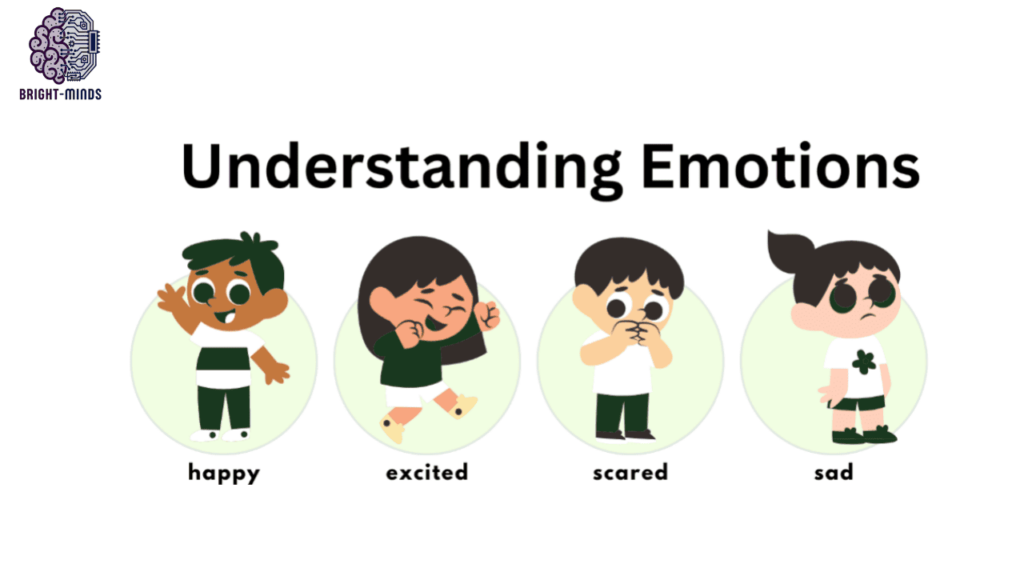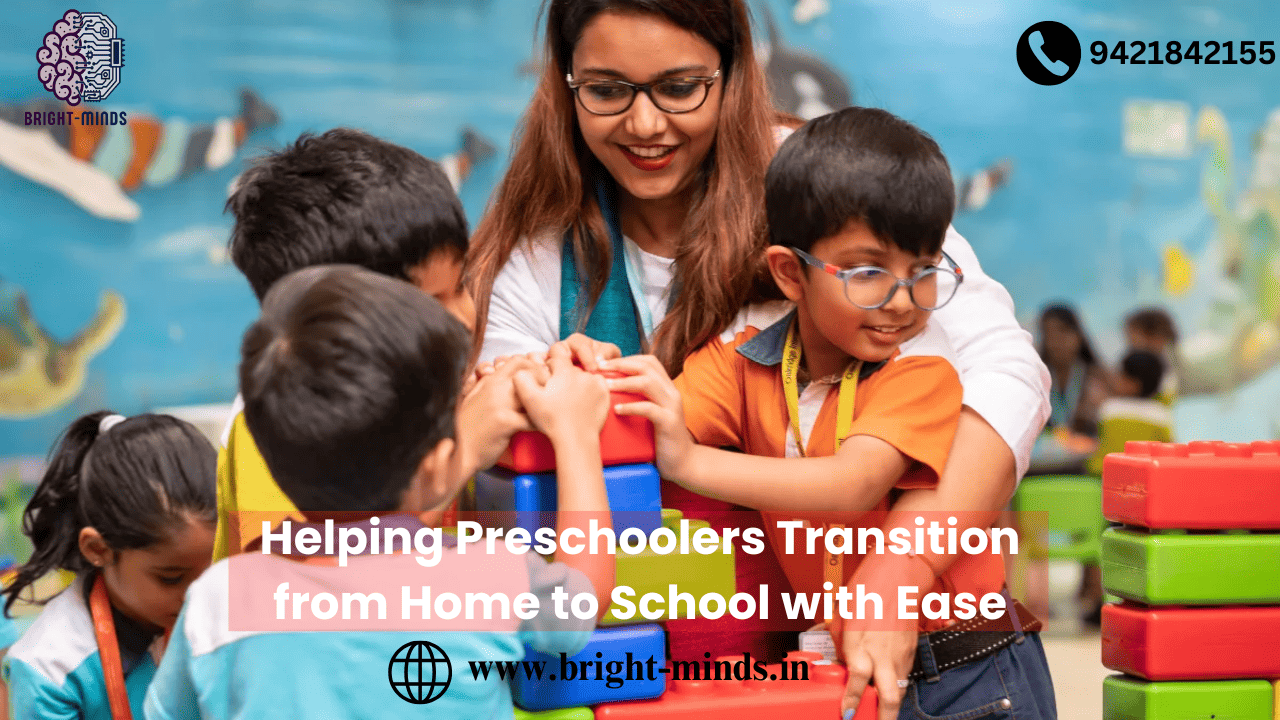Introduction
An important turning point in a child’s life is when they start school. This change can be both thrilling and frightening for preschoolers. It might be difficult to adjust to the more regimented, social environment of school after leaving the cozy, familiar surroundings of home. Preschoolers need our help to make this transition as seamless as possible as parents, guardians, and teachers so they feel safe, secure, and prepared to take on the new experiences that lie ahead.
1. Understanding the Emotional Impact of Transition

- Recognizing that preschoolers are going through a big emotional adjustment from home to school is the first step in helping them adjust. The first few years of a preschooler’s life have been spent with family, where they feel safe and secure. All of a sudden, they are expected to enter a strange setting with strangers, new customs, and expectations. Preschoolers’ feelings of anxiety, excitement, or even terror about attending school are rather common.
- It’s critical to acknowledge these feelings in order to offer the right kind of support. Shyness, separation anxiety, or anxiety might show up as a variety of symptoms, including difficulty sleeping the night before, clinging to parents, or a reluctance to attend school. Preschoolers occasionally even use behavioral changes like tantrums to communicate their concerns.
2. Prepare in Advance: Familiarization with the School Environment
Introducing preschoolers to their new school setting prior to the first day is one of the finest methods to help them feel at ease with the change. This lessens their fear and allows them to progressively investigate and adjust to the environment.
- Visit the school together: Before your preschooler’s first day, take them to school. Permit them to visit their classroom, meet their instructor, and explore other spaces like the restrooms or playground. They can feel less nervous and more in charge when you introduce them to the area and point out important locations.
- Make new friends: Try to introduce your youngster to their instructor or future classmates if at all possible. Building ties with peers at a young age can boost enthusiasm for attending school and give a sense of stability. Even orientation sessions are offered by some schools so that kids can meet other kids.
- Discuss the school day: Talk about the day’s schedule, including when they will arrive, who will pick them up, what will be done, and when they will return home. Assisting them in anticipating the day can reduce anxiety and provide a sense of predictability during the shift.
3. Create a Consistent Morning and Evening Routine
When introducing a preschooler to a school regimen, consistency is essential. Preschoolers can feel more safe and prepared for the day if regular morning and evening routines are established before school starts.
- Morning routine: Establish a straightforward yet orderly morning routine. This could entail getting dressed, eating breakfast, brushing your teeth, and waking up at the same time. Children feel more in control and establish a positive attitude for the day when they follow predictable steps. Give children the freedom to pack their school bag or choose their own clothes to promote independence.
- Evening routine: Establish a nightly schedule that encourages rest and gets your youngster ready for the day. Preschoolers can be helped to relax and sleep well by reading bedtime stories, discussing the day, or laying out their clothes for the next day. Their vigor and concentration the following day depend on getting enough sleep.
4. Foster Emotional Readiness
A preschooler’s ability to adapt to the school setting is greatly influenced by their emotional readiness. Some kids might be more gregarious and ready to interact with people by nature, while others might be more introverted or suffer from separation anxiety. Emotional preparedness can be developed with time, patience, and positive reinforcement regardless of disposition.
- Discuss feelings openly: Preschoolers should be encouraged to share their feelings about attending school. Are they intrigued, apprehensive, frightened, or excited? Saying something like, “It’s okay to feel nervous,” will validate their feelings. When they first start school, many children feel that way. Children feel heard and encouraged when their worries are given a voice.
- Provide reassurance: Assure young children that it’s acceptable to feel uncertain or anxious and stress that school is a secure environment where they may meet new people and discover fascinating things. Tell them about enjoyable events that are in store for them or share positive anecdotes about your own school experiences.
- Use a transitional object: Some kids find solace in bringing a little memento from home, such a family photo, a cherished stuffed animal, or a reassuring memento. During school hours, these transitional items might act as a reminder of home and offer a sense of stability.
5. Build Social Skills
Children are exposed to a variety of social experiences in school, such as navigating group activities and interacting with teachers and peers. There are a number of methods parents and other caregivers can support preschoolers in developing their social skills prior to the start of school, even if their social preparedness may vary.
- Playdates: Arrange for kids to play together, particularly if they will be attending the same preschool or school. Practice sharing, taking turns, and interacting with peers are all made possible by this. Children learn critical interpersonal skills like empathy and conflict resolution through social play.
- Model positive social behaviors:
- Preschoolers pick up social skills by observing the people in their environment. Exhibit good social skills by being helpful, sharing, and giving others a kind greeting. Preschoolers should be encouraged to engage in these behaviors in natural settings, such as the park or family get-togethers.
- Discuss school friendships: Before classes begin, have a conversation on the value of forming friendships and showing kindness to others. Instruct your youngster on how to share toys, ask to play, and identify themselves. Additionally, you can act out other social scenarios, such asking someone to sit next to you or bidding a teacher farewell.
6. Gradual Separation
Preschoolers frequently experience separation anxiety as they leave the comforts of home and family to begin attending school. It’s crucial to progressively ease your child’s transition to being away from you during the school day.
- Practice short separations: Prior to the start of school, have your child spend brief periods of time with a trusted friend or family. They will learn from this that they can enjoy their time apart from you and that separations are just temporary. Increase the distance between you gradually to boost your confidence.
- Create a goodbye routine: Create a straightforward and uplifting farewell routine. This might be a high five, a hug, or a unique statement like “See you after school.” Preschoolers benefit from a regular routine because it gives them confidence that they will be safe and soon see their parents again.
- Keep goodbyes brief and positive: Saying farewell should be cheerful and brief on the first day of school. It should be brief, kind, and comforting. Long goodbyes might make you and your child more anxious, which can make things more difficult. Tell your child that you will be there to pick them up at the end of the day and that they will have a good time.
7. Encourage Independence and Confidence
Preschoolers are starting to gain the independence and self-reliance necessary to succeed in a classroom setting. Your child will gain confidence and feel more in charge of their new school experience if you encourage them to take on age-appropriate chores.
- Practice self-care skills: Assist young children in practicing self-care skills including putting on their shoes, cleaning their hands, and using the restroom on their own. Children feel capable in a new setting and gain a sense of satisfaction from these minor victories.
- Promote problem-solving: Encourage preschoolers to solve basic problems at home by providing them with opportunity to do so. Ask them to help you prepare the table or figure out how to choose an outfit, for instance. Their confidence is increased and they are better equipped to handle any difficulties they may have in school if they are encouraged to think critically and solve problems.
- Celebrate successes: Give your child credit for their efforts while they adjust to school. Give them credit for their courage, independence, and any new abilities they pick up, no matter how minor.
8. Be Patient and Flexible
Every child is unique, and the transition from home to school will look different for each preschooler. Some children may adjust quickly and eagerly, while others may take more time to settle in. It’s important to be patient, flexible, and understanding as your child adjusts to their new school environment.
- Monitor progress: Observe how your child reacts to school on an emotional and behavioral level. It could be beneficial to talk to their teacher or a school counselor for extra support if they are displaying symptoms of distress or are having trouble adjusting.
- Allow time for adjustment: It’s common for kids to need some time to get used to a new schedule. While some toddlers may take weeks to feel fully at ease, others may just have separation anxiety for a few days. Give your child the time they require to adjust, and offer them constant assistance.
Conclusion
- A preschooler’s move from home to school is a significant life shift that calls for careful planning and assistance. Parents and teachers may facilitate this transition and create the conditions for a successful school experience by acquainting kids with the school setting, establishing regular routines, promoting social skills, and cultivating emotional readiness. Preschoolers may successfully cross this great milestone with confidence, excitement, and curiosity if they have a little preparation, patience, and understanding.
Also Read:
https://bright-minds.in/unlocking-word-meaning-for-class-ukg-english-to-hindi/

